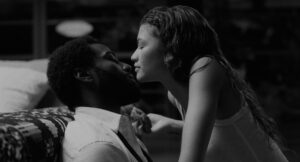Malcolm and Marie
Posted on February 4, 2021 at 5:14 pm
B +| Lowest Recommended Age: | Mature High Schooler |
| MPAA Rating: | Rated R for pervasive language and sexual content |
| Profanity: | Very strong language |
| Alcohol/ Drugs: | Alcohol |
| Violence/ Scariness: | Struggles, arguments |
| Diversity Issues: | A theme of the movie |
| Date Released to Theaters: | February 5, 2021 |

There’s a lot wrong or maybe it is more accurate to say missing in “Malcolm and Marie,” but given the way it was made, it is remarkable how much is right and it is never less than watchable thanks to the palpable magnetism and chemistry of its two stars, who make up the entire cast. This was a pandemic project, made by writer/director Sam Levinson, as he and Zendaya were on hiatus from their “Euphoria” series due to COVID-19 restrictions. So, this film preserves the classical unities of time and space and action, not as a tribute to Aristotle’s Poetics but as a way to keep everyone safe. The cast and crew quarantined together and the entire film takes place in real time during one late evening in one beautiful beach house. It is filmed in gorgeous black and white by Marcell Rév. And it has a script that could have used a couple more drafts.
Malcolm (Washington) and Marie (Zendaya) come home from a big, glittery event in very different moods, so different that they do not at first notice what is happening with each other. Malcolm is proud, happy, relieved, and excited. He pours himself a drink, cranks up the music, starts to dance, and asks Marie to make some mac and cheese.
Marie boils the water and cuts the butter, but she is quiet, reflective, possibly seething underneath.
Malcolm is an up-and-coming film director and they have just come from the premiere of his latest, the story of a young woman struggling with drug addiction. The premiere was a triumph, the kind that may have moved him from up-and-coming to arrived. Following the screening, he was complimented by everyone, even “the white lady critic from the LA Times.” He is delighted with the reaction, but it stings that her compliment compared him to directors like Spike Lee and Barry Jenkins, all Black filmmakers, and not to, say, William Wyler, a white director from the 1940s and 50s. Marie is feeling left out, partly for reasons we will discover, but initially because in his speech at the reception, he thanked a lot of people, including the star of the film, but did not thank her. He apologized in the car on the way home, but it still bothers her.
The rest of the film is up and down and back and forth as they argue, make up, argue, make up, argue, and possibly make up again. There are elements of “Who’s Afraid of Virginia Woolf” as their arguments strip away the boundaries enduring couples are careful to protect, but in this case there is no bewildered, meek, and tipsy other couple to perform for; there is just us. Washington and Zendaya are never less than utterly present, utterly vulnerable, and utterly in control of the constantly shifting moods, challenging and matching each other in every beat as characters and as performers. It is a wonder to watch.
And it is impossible not to be sympathetic to the movie’s failures because they are the faults of daring too much, when too many movies fail for the opposite reason. “Malcolm and Marie” tries to bring a lot into the world of these two people in two hours, with issues of race and culture and the relationship of the critic to the artist and who gets credit for what and when and probably also what art is for in the first place. A lot a lot a lot, all from two people talking. It is unlikely that it would have been made this way without the restrictions of a pandemic, including the claustrophobia of the entire crew quarantining together. What other conditions could create this work? How else could we explore these issues in this way? Think of other movies about two people talking. “My Dinner with Andre” was constructed, with everyone going home after a day of shooting, and “Before Sunrise” and “Columbus” had whole cities to explore.
“Malcolm and Marie” may end up as a footnote in what are sure to be long and rich careers for the filmmakers. But it is well worth seeing as an example of what can be done when it seems like nothing is possible, indeed what can be inspired by a moment that seems stuck. I came away hoping the characters go on together and looking forward to whatever Washington and Zendaya do next.
Parents should know that this movie includes very strong language, explicit sexual references and situations, tense confrontations, and discussions of drug addiction.
Family questions: Do your sympathies shift back and forth over the course of the movie? When? Why?
If you like this, try: “Who’s Afraid of Virginia Woolf” and “My Dinner with Andre” as well as other films from Washington and Zendaya and the works of William Wyler
